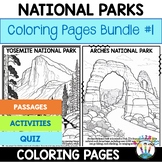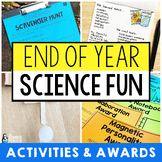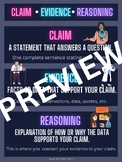66 results
1st grade astronomy scripts for homeschool
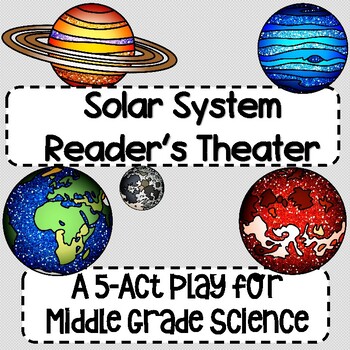
Solar System Reader's Theater
This science activity is a 5-Act, 25-role reader's theater script for the the Solar System, perfect for any middle grade astronomy unit! Students will learn about the Earth and moon, the other planets, as well as the sun and stars! Reader's Theater is an engaging instructional strategy for students that allows them to act out various historical scenes and scientific phenomena. This resource also helps build fluency and reading comprehension skills.The acts are as follows:Act I: Early Discoveries
Subjects:
Grades:
4th - 7th
Types:
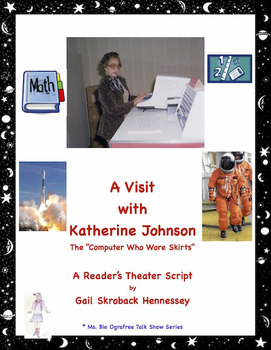
Katherine Johnson: Scientist:The Computer that Wore Skirts(Play)
Learn about Katherine Johnson, a physicist, space scientist and mathematician, who played a very important role with NASA’s early space missions. The movie Hidden Figures highlights the role of NASA's "computers" such as Katherine Johnson and their contributions. Part of my Ms. Bie Ografee Talk Show Series of Reader's Theater Scripts, there are comprehension questions, a Did You Know? section,a Teacher page with extensions/links and key. A great STEM biography!Additional Resources on this Topic
Grades:
5th - 9th
Also included in: Trailblazers in Science(SIX STEM Biographical Plays)BUNDLE of RESOURCES
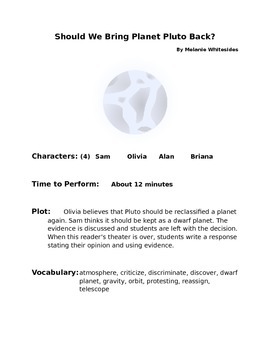
Should We Bring Planet Pluto Back?
This reader's theater is for a small group of 4. In it, Olivia believes that Pluto should be reclassified a planet again. Sam thinks it should be kept as a dwarf planet. The evidence is discussed and students are left with the decision. When this reader’s theater is over, students write a response stating their opinion and using evidence. I wrote this one because my students enjoyed debating it became a good way to get interest built up for an argumentative paper. I use all of my Reader's Theate
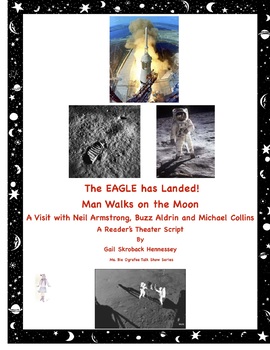
Moon Landing: Man Walks on the Moon! A Reader’s Theater Script
After 76 days, Neil Armstrong, Buzz Aldrin and Michael Collins, the astronauts for the historic Apollo 11 mission to the moon, made history on July 20, 1969. After the Columbia reached the moon’s orbit, Armstrong and Aldrin went into a smaller module, the Eagle. They began a descent onto the surface of the moon and successfully landed on the moon where both men would become the first humans to actually walk on the moon. The date was July 21, 1969!Just think, from the first powered flight in 190
Subjects:
Grades:
4th - 9th
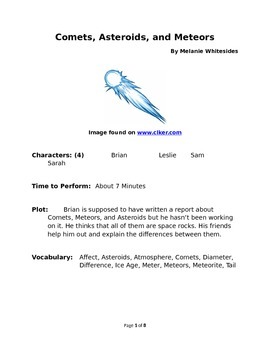
Comets, Asteroids, and Meteors - Small Group Reader's Theater
This Reader's Theater was written for a small group of 4 students. It is to help explain what comets, meteors, and asteroids are. In the script, Brian is supposed to have written a report about Comets, Meteors, and Asteroids but he hasn’t been working on it. He thinks that all of them are space rocks. His friends help him out and explain the differences between them. I write small group reader's theaters so they will work better in centers and to avoid having long wait times between student's li
Subjects:
Grades:
4th - 7th
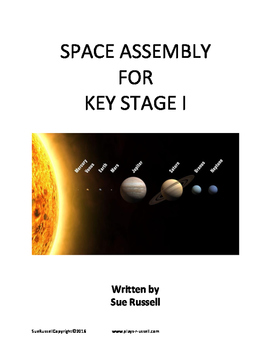
Space Class Play
Space Class Play for Key Stage I
This class play or assembly was written for 5 – 7 year olds *(version for older children also available)
Cast of 30 - easily adapted up or down
Duration - 15 - 20 minutes
Fun 'romp' through Space - with astronauts and, most importantly, rocket men - who would have thought an astronaut could forget his own rocket?! All 8 planets covered - before Narrator returns to Earth!
*Also available off this website and www.plays-r-ussell.com : Key Stage II version of this sc
Subjects:
Grades:
1st - 4th
Types:
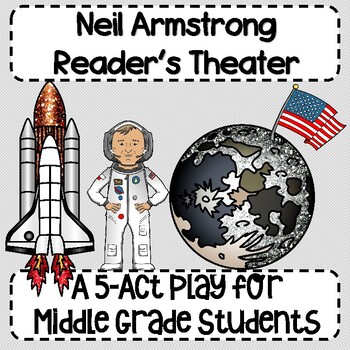
The Life of Neil Armstrong Reader's Theater
This activity is a 5-act, 25-role reader's theater script for The Life of Neil Armstrong! The script is research-based, historically accurate, and is great for classes studying American history or space exploration! Reader's Theater is an engaging instructional strategy for students that allows them to act out various historical scenes. This product also helps build fluency and reading comprehension skills. The acts are as follows: Act I: Early LifeAct II: Becoming an AstronautAct III: The Spa
Subjects:
Grades:
4th - 7th
Types:

The Planets Class Play or Assembly
This class play or assembly covers all the planets in our solar system. It is based on the science curriculum for primary/elementary schools and is a fun way for children to learn 'astronomic' facts and become familiar with the great classical music of The Planets - Holst. (See music list below)
Music
1. Theme music to 2001 Space Odyssey/Star Trek/Lost in Space; or Rocket Man - Elton John.
2. Bohemian Rhapsody (Opening lines up to 'Look up to the skies and see' )- Queen
3. Ground Control to Maj
Subjects:
Grades:
3rd - 8th
Types:
![Preview of [TED ED] [Out of this World] #31-48 Astronomy 16 worksheets Bundle (3)](https://ecdn.teacherspayteachers.com/thumbitem/-TED-ED-Out-of-this-World-31-48-Astronomy-16-worksheets-Bundle-3--8084940-1652697239/original-8084940-1.jpg)
[TED ED] [Out of this World] #31-48 Astronomy 16 worksheets Bundle (3)
[TED ED] [Out of this World] #31-48 Astronomy 16 worksheets Bundle31 What light can teach us about the universe 32 How to detect a supernova 33 Could comets be the source of life on Earth?35 Can a black hole be destroyed? 36 There may be extraterrestrial life in our solar system 37 The dust bunnies that built our planet 38 Einstein's twin paradox explained 39 Are we living in a simulation? 41 NASA’s first software engineer: Margaret Hamilton42 Newton’s three-body problem explained43 Could we har
Subjects:
Grades:
8th - 12th, Higher Education, Adult Education
Types:
![Preview of [TED ED] [Out of this World] #1-15 Astronomy 15 worksheets Bundle](https://ecdn.teacherspayteachers.com/thumbitem/-TED-ED-Out-of-this-World-1-15-Astronomy-15-worksheets-Bundle-8084454-1652684049/original-8084454-1.jpg)
[TED ED] [Out of this World] #1-15 Astronomy 15 worksheets Bundle
[TED ED] [Out of this World] #1~15 Astronomy 15 worksheets Bundle1 Could we actually live on Mars? 2 Where does gold come from? 3 The journey to Pluto, the farthest world ever explored 4 Light seconds, light years, light centuries: How to measure extreme distances 5 How fast are you moving right now?6 The death of the universe7 Who won the space race? 8 The beginning of the universe, for beginners 9 How small are we in the scale of the universe? 10 The moon illusion 11 What creates a total solar
Subjects:
Grades:
8th - 12th, Higher Education, Adult Education
Types:
![Preview of [TED ED] [Out of this World] #16-30 Astronomy 15 worksheets Bundle](https://ecdn.teacherspayteachers.com/thumbitem/-TED-ED-Out-of-this-World-16-30-Astronomy-15-worksheets-Bundle-8084742-1652693845/original-8084742-1.jpg)
[TED ED] [Out of this World] #16-30 Astronomy 15 worksheets Bundle
[TED ED] [Out of this World] #16~30 Astronomy 15 worksheets Bundle16 Is there a center of the universe? 17 Why is NASA sending a spacecraft to a metal world? 18 Should we be looking for life elsewhere in the universe?19 Three ways the universe could end 20 What is the universe made of? 21 Sunlight is way older than you think 22 Four ways to understand the Earth's age 23 How far would you have to go to escape gravity?24 Could we survive prolonged space travel? 25 Would you live on the moon?26 How
Subjects:
Grades:
8th - 12th, Higher Education, Adult Education
Types:
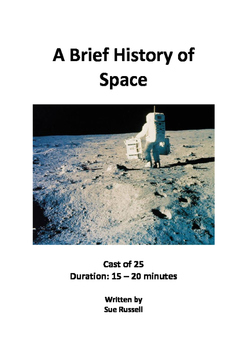
Brief History of Space Class Play
A Brief History of Space Class Play
Written by Sue Russell
Cast of 25 (easily adapted up or down)
Duration 15 - 20 minutes (up to 30 minutes with inclusion of music)
This play includes 8 Astronauts, 8 Astronomers, 8 Scientists ... and a rather 'challenged' Narrator! It covers a brief history of Space, the final section attempting to throw a little more light on this fascinating but sometime rather bewildering subject!
This is the first of a series of scripts on Space, written as a set of 4, the
Subjects:
Grades:
4th - 9th
Types:
![Preview of [TED ED] [Out of this World] #36 There may be extraterrestrial life in our solar](https://ecdn.teacherspayteachers.com/thumbitem/-TED-ED-Out-of-this-World-36-There-may-be-extraterrestrial-life-in-our-solar-8084828-1652695491/original-8084828-1.jpg)
[TED ED] [Out of this World] #36 There may be extraterrestrial life in our solar
31 What light can teach us about the universe 32 How to detect a supernova 33 Could comets be the source of life on Earth?35 Can a black hole be destroyed? 36 There may be extraterrestrial life in our solar system 37 The dust bunnies that built our planet 38 Einstein's twin paradox explained 39 Are we living in a simulation? 41 NASA’s first software engineer: Margaret Hamilton42 Newton’s three-body problem explained43 Could we harness the power of a black hole? 44 What if every satellite suddenl
Subjects:
Grades:
8th - 12th, Higher Education, Adult Education
Types:
Also included in: [TED ED] [Out of this World] #31-48 Astronomy 16 worksheets Bundle (3)
![Preview of [TED ED] [Out of this World] #9 How small are we in the scale of the universe?](https://ecdn.teacherspayteachers.com/thumbitem/-TED-ED-Out-of-this-World-9-How-small-are-we-in-the-scale-of-the-universe--8084422-1652682080/original-8084422-1.jpg)
[TED ED] [Out of this World] #9 How small are we in the scale of the universe?
1 Could we actually live on Mars? 2 Where does gold come from? 3 The journey to Pluto, the farthest world ever explored 4 Light seconds, light years, light centuries: How to measure extreme distances 5 How fast are you moving right now?6 The death of the universe7 Who won the space race? 8 The beginning of the universe, for beginners 9 How small are we in the scale of the universe? 10 The moon illusion 11 What creates a total solar eclipse? 12 What is the universe expanding into?13 Could the Ear
Subjects:
Grades:
8th - 12th, Higher Education, Adult Education
Types:
Also included in: [TED ED] [Out of this World] #1-15 Astronomy 15 worksheets Bundle
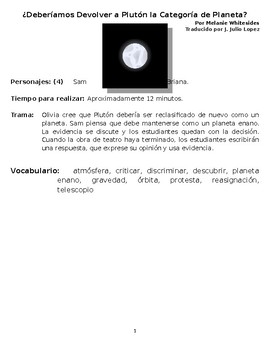
Should We Bring Planet Pluto Back? - Spanish Reader's Theater for Small Groups
This Reader's Theater was written for a small group of 4 students. In Spanish the title would be '¿Deberíamos Devolver a Plutón la Categoría de Planeta?' It is to help students understand how planets are classified. It is great way to tie in Science with Language Arts and Spanish! In the script, a girl named Olivia believes that Pluto should be reclassified a planet again. Sam thinks it should be kept as a dwarf planet. The evidence is discussed and students are left with the decision. When this
Subjects:
Grades:
4th - 12th, Adult Education
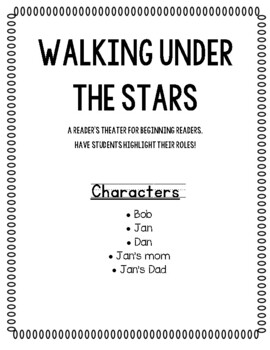
Reader's Theater Script | Constellation and Stars | Beginning Readers
A great readers theater for 1st-3rd grade students that can be used any time of the year! Perfect for any units on stars, space, or constellations!
Subjects:
Grades:
1st - 3rd
Types:
![Preview of [TED ED] [Out of this World] #31 What light can teach us about the universe](https://ecdn.teacherspayteachers.com/thumbitem/-TED-ED-Out-of-this-World-31-What-light-can-teach-us-about-the-universe-8084799-1652694750/original-8084799-1.jpg)
[TED ED] [Out of this World] #31 What light can teach us about the universe
31 What light can teach us about the universe 32 How to detect a supernova 33 Could comets be the source of life on Earth?35 Can a black hole be destroyed? 36 There may be extraterrestrial life in our solar system 37 The dust bunnies that built our planet 38 Einstein's twin paradox explained 39 Are we living in a simulation? 41 NASA’s first software engineer: Margaret Hamilton42 Newton’s three-body problem explained43 Could we harness the power of a black hole? 44 What if every satellite suddenl
Subjects:
Grades:
8th - 12th, Higher Education, Adult Education
Types:
Also included in: [TED ED] [Out of this World] #31-48 Astronomy 16 worksheets Bundle (3)
![Preview of [TED ED] [Out of this World] #24 Could we survive prolonged space travel? works](https://ecdn.teacherspayteachers.com/thumbitem/-TED-ED-Out-of-this-World-24-Could-we-survive-prolonged-space-travel-works-8084540-1652688370/original-8084540-1.jpg)
[TED ED] [Out of this World] #24 Could we survive prolonged space travel? works
16 Is there a center of the universe? 17 Why is NASA sending a spacecraft to a metal world? 18 Should we be looking for life elsewhere in the universe?19 Three ways the universe could end 20 What is the universe made of? 21 Sunlight is way older than you think 22 Four ways to understand the Earth's age 23 How far would you have to go to escape gravity?24 Could we survive prolonged space travel? 25 Would you live on the moon?26 How to build a dark matter detector 27 Why neutrinos matter 28 How do
Subjects:
Grades:
8th - 12th, Higher Education, Adult Education
Types:
Also included in: [TED ED] [Out of this World] #16-30 Astronomy 15 worksheets Bundle
![Preview of [TED ED] [Out of this World] #2 Where does gold come from? worksheets](https://ecdn.teacherspayteachers.com/thumbitem/-TED-ED-Out-of-this-World-2-Where-does-gold-come-from-worksheets-8084397-1652680918/original-8084397-1.jpg)
[TED ED] [Out of this World] #2 Where does gold come from? worksheets
1 Could we actually live on Mars? 2 Where does gold come from? 3 The journey to Pluto, the farthest world ever explored 4 Light seconds, light years, light centuries: How to measure extreme distances 5 How fast are you moving right now?6 The death of the universe7 Who won the space race? 8 The beginning of the universe, for beginners 9 How small are we in the scale of the universe? 10 The moon illusion 11 What creates a total solar eclipse? 12 What is the universe expanding into?13 Could the Ear
Subjects:
Grades:
8th - 12th, Higher Education, Adult Education
Types:
Also included in: [TED ED] [Out of this World] #1-15 Astronomy 15 worksheets Bundle
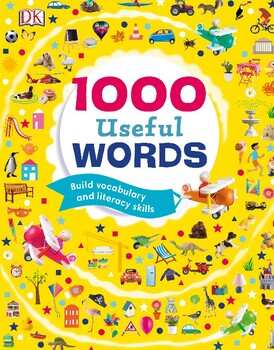
1000 Useful Words - Build Vocabulary and Literacy Skills
This exciting collection of 1,000 words will broaden young children's vocabulary, and strengthen their early reading and writing skills. Arranged thematically, topics include Me and My Family, Animals, How We Look and Feel, Around the World, and I know... Colors, Shapes, Numbers, Weather, and Seasons. There are also four "story style" spreads that tell a simple narrative and inspire storytelling skills: for example, All in a Day is about a young child's typical day, and If I Were a Pet looks at
Subjects:
Grades:
PreK - 8th
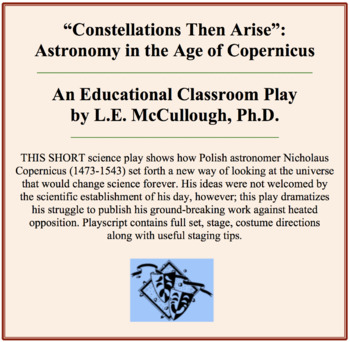
“Constellations Then Arise”: Astronomy in the Age of Copernicus
THIS SHORT science play shows how Polish astronomer Nicholaus Copernicus (1473-1543) set forth a new way of looking at the universe that would change science forever. His ideas were not welcomed by the scientific establishment of his day, however; this play dramatizes his struggle to publish his ground-breaking work against heated opposition. Playscript contains full set, stage, costume directions along with useful staging tips.
Subjects:
Grades:
4th - 10th
Types:
![Preview of [TED ED] [Out of this World] #47 actually building an elevator to space](https://ecdn.teacherspayteachers.com/thumbitem/-TED-ED-Out-of-this-World-47-actually-building-an-elevator-to-space-8084920-1652696827/original-8084920-1.jpg)
[TED ED] [Out of this World] #47 actually building an elevator to space
31 What light can teach us about the universe 32 How to detect a supernova 33 Could comets be the source of life on Earth?35 Can a black hole be destroyed? 36 There may be extraterrestrial life in our solar system 37 The dust bunnies that built our planet 38 Einstein's twin paradox explained 39 Are we living in a simulation? 41 NASA’s first software engineer: Margaret Hamilton42 Newton’s three-body problem explained43 Could we harness the power of a black hole? 44 What if every satellite suddenl
Subjects:
Grades:
8th - 12th, Higher Education, Adult Education
Types:
Also included in: [TED ED] [Out of this World] #31-48 Astronomy 16 worksheets Bundle (3)
![Preview of [TED ED] [Out of this World] #42 Newton’s three-body problem explained worksheet](https://ecdn.teacherspayteachers.com/thumbitem/-TED-ED-Out-of-this-World-42-Newton-s-three-body-problem-explained-worksheet-8084876-1652696208/original-8084876-1.jpg)
[TED ED] [Out of this World] #42 Newton’s three-body problem explained worksheet
31 What light can teach us about the universe 32 How to detect a supernova 33 Could comets be the source of life on Earth?35 Can a black hole be destroyed? 36 There may be extraterrestrial life in our solar system 37 The dust bunnies that built our planet 38 Einstein's twin paradox explained 39 Are we living in a simulation? 41 NASA’s first software engineer: Margaret Hamilton42 Newton’s three-body problem explained43 Could we harness the power of a black hole? 44 What if every satellite suddenl
Subjects:
Grades:
8th - 12th, Higher Education, Adult Education
Types:
Also included in: [TED ED] [Out of this World] #31-48 Astronomy 16 worksheets Bundle (3)
![Preview of [TED ED] [Out of this World] #39 Are we living in a simulation? worksheets](https://ecdn.teacherspayteachers.com/thumbitem/-TED-ED-Out-of-this-World-39-Are-we-living-in-a-simulation-worksheets-8084855-1652695897/original-8084855-1.jpg)
[TED ED] [Out of this World] #39 Are we living in a simulation? worksheets
31 What light can teach us about the universe 32 How to detect a supernova 33 Could comets be the source of life on Earth?35 Can a black hole be destroyed? 36 There may be extraterrestrial life in our solar system 37 The dust bunnies that built our planet 38 Einstein's twin paradox explained 39 Are we living in a simulation? 41 NASA’s first software engineer: Margaret Hamilton42 Newton’s three-body problem explained43 Could we harness the power of a black hole? 44 What if every satellite suddenl
Subjects:
Grades:
8th - 12th, Higher Education, Adult Education
Types:
Also included in: [TED ED] [Out of this World] #31-48 Astronomy 16 worksheets Bundle (3)
Showing 1-24 of 66 results


